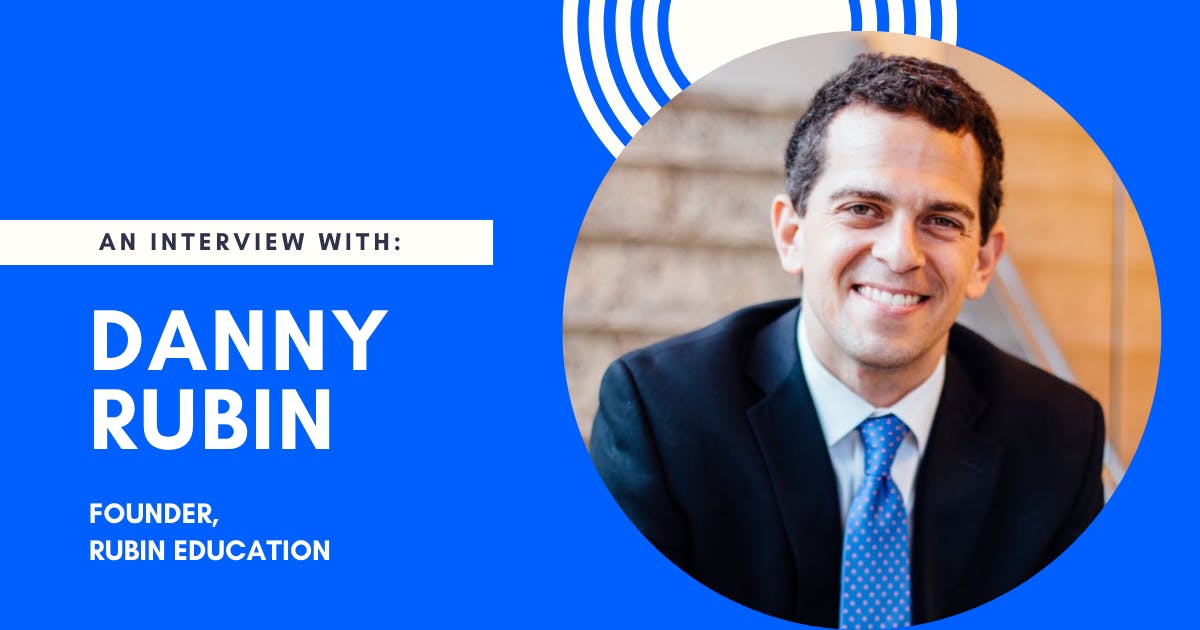The core subjects of mathematics, science, English, and history are critical to academic success. However, many institutions fail to teach essential skills for career development, such as effective email and video chat communication, managing client relations, and more.
Danny Rubin, founder of Rubin Education, identified this learning gap while working as a broadcast journalist in his twenties.
An expert in clear, friendly communication, his friends would often ask him to review their email communications to hiring managers and job prospects. Rubin launched a blog about email and phone etiquette and later wrote several books on the subject, focusing on tangible tips and email templates rather than motivational stories or quotes.
As his blog’s readership skyrocketed, Rubin reorganized his content into coursework to provide a value-added educational service. Soon, schools and universities were interested in partnering with Rubin Education to teach students real-life skills to get hired, build meaningful working relationships with colleagues, and manage clients.
Here, Rubin explores how edtech can support school systems in under-taught topics, and explains the nuances of integrating external content into existing learning management systems.
What is Rubin Education, and what motivated you to launch the company?
I am a former CBS news station reporter, and during my broadcast career, I gained a lot of communication skills. I was always inclined to teach, so I started a blog designed to educate readers on email and phone communication. I provided a lot of email templates, such as follow-up notes to an interview.
When my blog traffic started to grow, I realized there was a significant need for this type of real-world education. Universities often teach you how to create a resume and cover letter, but there are huge vulnerabilities around the many back-and-forth messages and phone calls that cinch job offers.
Who are your education partners?
We provide content for students of all ages, even working professionals, seeking to improve their email and phone etiquette. Our curriculum is unique because classroom plans don’t often cover business communication skills. We even provide coursework for middle-school kids to improve their digital literacy early on.
We have excellent relationships with teachers in school districts across the country, including Miami-Dade County Public Schools, Atlanta Public Schools, Los Angeles Unified Public Schools, and colleges such as The University of Alabama and Michigan State.
What is the most important lesson you’ve learned while building Rubin Education?
The most important thing for edtech companies to keep in mind is learning tools’ interoperability, referred to as LTI. Most school systems use one of seven major learning management systems (LMS): Canvas, Blackboard, Schoology, Desire2Learn, Moddle, Sakai, or Google Classroom.
We don't require a separate LMS to access our courses. This is especially helpful for young professionals who aren't affiliated with an educational institution. But schools prioritize content vendors that can integrate into the LMS students use every day. LTI is a critical feature to help our platform grow because schools value single sign-in functionalities.
At a basic level, LTI works by layering our website into a learning management system, similar to an iframe. It’s our content, but students and teachers can access it on the platform in which they are most familiar.
What is the future of edtech?
We already see many edtech platforms leveraging AI and natural language processing, and schools will have to figure out the most ethical, moral ways to use this technology, such as edtech messaging.
There are some issues with AI. For example, we’ve seen different curriculum providers use AI for grading. But pretty quickly, students learned how to game the system by jamming their projects with specific keywords so the system recognizes their work as an A. So it will be interesting to see how schools effectively implement AI over the next couple of years to improve learning.
The pandemic forced many schools to adopt learning management systems for the first time, and teachers had to pivot very fast. Out of necessity, they brought themselves to a new level.
Stream's Takeaway: Content deliverability and single sign-on are top features schools value when seeking new edtech partnerships. Edtech platforms should focus on building out their learning tool interoperability to meet schools where they are.
Interested in learning how product managers are evolving edtech tools to serve the diverse needs of all education stakeholders? Download Stream's free ebook, Edtech Today: 8 Startups on Managing Exponential Growth.

